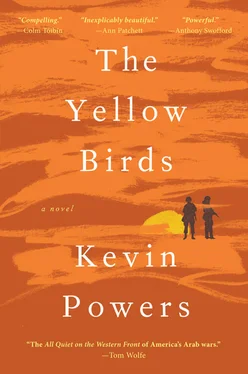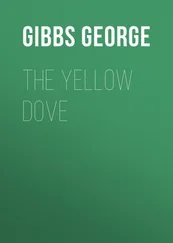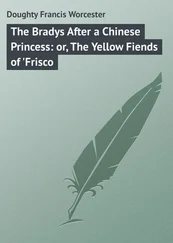Murph paused. “Everything’s just so goddamn funny.” He had the letter folded in his lap, and he bent his head backward, and the outline of his face was oriented toward the sky. He made a childish connection, but a beautiful one, and his face, looking through the thin fingers of the hawthorn that rose out of the dust, seemed to connect the long black veil of sky above us, a few stars in its stitching, to whatever sky his girl sat beneath. And yes, it was full of naïveté and boyishness, but that is all right, because we were boys then. It makes me love him a little, even now, to remember him sitting beneath the hawthorn tree, sad that his girl had left him, but without anger or resentment, despite being only a few hours removed from all the killing of the night before. He sat there in the dark. We spoke like children. We looked at each other as if into a dim mirror. I remember that part of him fondly, before he was lost, before he surrendered fully to the war, twisting through the air, perhaps one beat of his heart remaining as they threw his tortured body from the window of the minaret.
I put out my hand and gestured for him to hand me the picture. It was a Polaroid of Murph and his girl. They stood on a dirt track. The earth rose behind them, up out of the picture toward its promontory. The mountain was covered by beech and magnolia, white ash and maple, tulip trees, and all the colors of the flowers were bright and definite in the rays of light that settled down through the upper branches. She wore a dress of blue-dyed muslin that had been worn thin, and the light in the picture passed through the thin fabric slightly, revealing the shape of her body. Her hair was brown and a little stringy and in the picture a few strands came to rest on her high, pink cheeks. Her mouth was closed. She did not smile and her eyes were gray and warm above a hand that looked as if it was captured on its way to brush stray hairs from her face.
Then Murph next to her. His hands in the pockets of his blue jeans. Her other hand on the small of his back. Alive. There was an expression on his face that I have never seen before or since. I have convinced myself that this was the expression of one who knew, but he could not have. There was something fleeting in the picture, though I didn’t know it then. He had an easy half smile, and his eyes squinted in the light. What was there of permanence in the picture? I wondered if the girl would ever stand on that spot again. If she did, would she reach for the small of his back?
“Who took it?”
He squatted on the back of his calves, pulling a rub out and putting it in his bottom lip. The smell was sweet and pungent and filled the calm air. “My mom did, summer before last. I guess we were sixteen, almost seventeen in it. Marie’s a good girl. I can’t say I blame her. Too smart to stick with me.”
Sterling had been listening to us talk. He loped over out of the dark on the other side of the tree. “I’d kill a bitch,” he interjected. “You’re not really gonna take that shit, are you, Private?”
“I guess I figure it’s not my call to make no more, Sarge.”
Sterling put his hands on his hips and seemed to be waiting for Murph to say something else. It was as if that line of words had been hung up in a place Sterling couldn’t reach, so he just stood there, disregarding, waiting to be readdressed. But Murph did not respond. Neither did I. We just looked at him, half leaning against the wall. Behind us a streetlamp came on. It was the only one to survive the battle, and it illuminated the field where the dead lay scattered and it shined its light briefly into the scarred earth where the mortars had fallen. It flickered. In the intermittent light Sterling seemed to flicker also, appearing and disappearing. The light went out for a short stretch, and Sterling walked away.
I want him to resist now, as I remember it. Not like Sterling suggested, but to resist nonetheless. It wasn’t that I thought he should have hoped that his being abandoned could be changed, but I wanted something that I could look back on and say, yes, you were fighting too, you burned to be alive, and whatever failure or accident of nature caused you to be killed could be explained by something other than the fact that I’d missed your giving up.
Murph looked at me and shrugged his shoulders. I handed him back the picture of Marie, and he took his helmet off, resting it between his legs in the dust. He took out his casualty feeder card from a ziplock bag under his helmet liner and put the picture behind it. He held the card and the picture and looked at them in the unsteady light, and I read the sections of the card that Murph had already filled in.
At the top of the card, in the appropriate boxes, Murph had written the requested information. His name: Murphy, Daniel; his social security number; his rank; his unit. Below that were other boxes, left blank in case the need arose to record an assortment of information with a quick X in ink. There was a box for Killed in Action, for Missing in Action, and for Wounded in Action (either lightly or seriously). There was a box for Captured, and for Detained, and for Died as a Result of Wounds. There were two sets of Yes or No boxes, one each for Body Recovered and Body Identified. There was a space for witness remarks and for the signature of the commanding officer or medical personnel. Murph had placed an X in the box for Body Recovered. “Just in case,” he said when he caught me looking. Both of our cards were signed already.
Murph folded the picture up with the card and put them both back under his helmet liner. I cut open my package and pulled out a bottle of Gold Label sent by one of my high school buddies. I shook the bottle gently back and forth, saying, “Look what we got here.” He smiled and put his helmet to the side and he slid along the wall to get a little closer to me. I put my hand out with the bottle and he waved me off.
“I believe you have the honor, sir.”
We both laughed. I took a long pull of the whiskey. It burned inside my nose and down my throat and down into my stomach. I had to wipe the back of my hand across my mouth because we were laughing. Murph took the bottle and took a long swallow. For a moment we forgot our predicament and were just two friends drinking under a tree, leaned up against a wall, trying to muffle our laughter so we would not get caught. Murph stifled his laughter until his body was racked with deep spasms that caused his armor to rattle, grenades to softly tinkle against one another, until all the accoutrements of battle jingled slightly and he had to stop himself, repeating, “All right, I’m good,” with a mock stone face until he had regained his bearing. When he handed me back the bottle he sighed deeply. “Look out over there.”
Murph pointed to the low hills around the city. Small fires had sprung up in the distance. A few city lights and the fires on the hillsides burned like a tattered quilt of fallen stars. “It’s beautiful,” I whispered. I was not sure if anyone heard me, but I saw others point their fingers off into the darkness.
We stayed like that for a while. The night grew cool and the smell of the fires burning was bright and clean and cut through the air like a spring wind out of season. I started to feel a little drunk as we traded the bottle back and forth. We rested our chins on our arms and our arms on the top of the low mud-brick wall and we watched the little fires the citizens made speckle the hillsides in every direction.
“It must be the whole city out there,” Murph said, and I thought of the line of people who rode or walked or ran out of Al Tafar four days ago, how they waited patiently for us to leave, for the enemy to leave, how when the battle was over they would come back and begin to sweep the shells off the roofs of their houses, how they would fill buckets of water and splash them over the dried, coppery blood on their doorsteps. We could hear a soft keening while we watched the low hills and desert glimmer in the darkness.
Читать дальше












